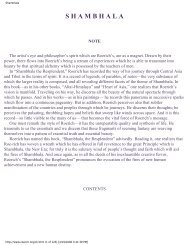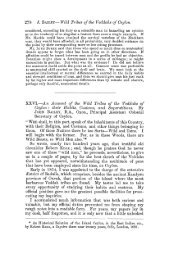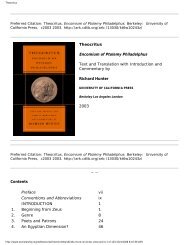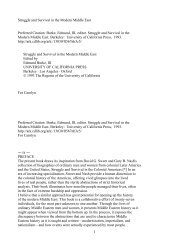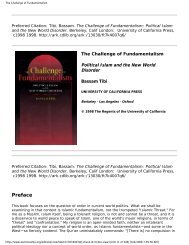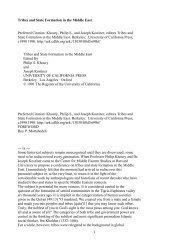Between Two Worlds Kafadar.pdf
Between Two Worlds Kafadar.pdf
Between Two Worlds Kafadar.pdf
You also want an ePaper? Increase the reach of your titles
YUMPU automatically turns print PDFs into web optimized ePapers that Google loves.
71. Galatariotou, "Structural Oppositions" For a balanced discussion of raiding<br />
economy, the claim of operating for the sake of one's faith, and an honor code<br />
all working together in another environment, see C. W. Bracewell, The Uskoks of<br />
Senj: Piracy, Banditry, and Holy War in the Sixteenth-Century Adriatic (Ithaca,<br />
1992).<br />
72. "The enemy thus in Digenes is not the Arab for the Byzantine, nor the<br />
Byzantine for the Arab. The people whom Digenes consistently puts down are<br />
coloured neither by race nor by creed, but by their contempt for the unwritten<br />
rules of the code of honour. Such is Digenes' conflict with the apelatai. The<br />
apelarai are the main villains of the story" (Galatariotou, "Structural<br />
Oppositions," 48). On who the apelatai may have been, see ibid.<br />
73. Ahmad * Ibn `Arabshah * , Tamerlane, or Timur the Great Amir, trans. J. H.<br />
Sanders (London, 1936), 201.<br />
74. Galatariotou, "Structural Oppositions" 44-45.<br />
75. Cited in Tekin, "XIVüncü Yüzyila Ait Bir Ilm-i * Hâl," 286.<br />
76. See section edited by Tekin in "XIV. Yüzyilda Yazilmis * Gazilik Tarikasi,"<br />
162. This situation was not necessarily hypothetical. Pachymeres, the Byzantine<br />
chronicler, for instance, writes that some of the Byzantine soldiers in the<br />
district of Nicaea served the Turks as guides when their tax exemptions were<br />
abolished by the emperor after the seat of government moved back to<br />
Constantinople (cited in Inalcik * , "Siege of Nicaea," OE, 79). Notwithstanding<br />
its negative moral connotation, the fact that mudara * (feigned peace) was a<br />
legally sanctioned category of behavior vis-à-vis infidels must have provided<br />
Muslim frontier warriors with some flexibility even when they needed or wanted<br />
to be canonically correct. On this notion, see H. J. Kissling,<br />
Rechtsproblematiken in den christlich-muslimischen Beziehungen, vorab im<br />
Zeitalter der Türkenkriege (Graz, 1974). Moreover, this was not the only<br />
relevant category; on istimalet * (conciliatory policy), see Inalcik * ,<br />
"Methods of Conquest"<br />
77. For the efficacy of this argument, see Vryonis, Decline of Medieval<br />
Hellenism , 435. Based on a critical survey of some late Byzantine<br />
hagiographies, Zachariadou concludes (in a paper delivered at Princeton<br />
University in 1987) that churchmen were wary of this sentiment because it was<br />
gaining currency and leading many Christians to convert to Islam.<br />
78. Taskoprizade * , Al-Saka'ik * , 28-29.<br />
79. Apz, ed. Giese, 9.<br />
80. Ibid.<br />
81. Related among the events of A.H. 139 in Baladhuri's * Kitab * Futuh *<br />
al-Buldan * , trans. P. K. Hitti in The Origins of the Islamic State, 2 vols.<br />
(1916; New York, 1968), 292.<br />
82. Topkapi Palace Archives, E. 5584.<br />
83. Cited in J. F. Richards, "Outflows of Precious Metals from Early Islamic<br />
India," in Precious Metals in the Later Medieval and Early Modem <strong>Worlds</strong>, ed. J.<br />
F. Richards (Durham, N.C., 1983), 195.<br />
84. The same point has already been made by Ménage in "The Beginnings of Ottoman<br />
Historiography; in The Historians of the Middle East, ed. B. Lewis and P. M.<br />
Holt (London, 1962): "The fact that many campaigns are directed against Muslim<br />
states is irrelevant, for these fellow-Muslims are regarded as hindering the<br />
ghaza * " (177-78).<br />
152




